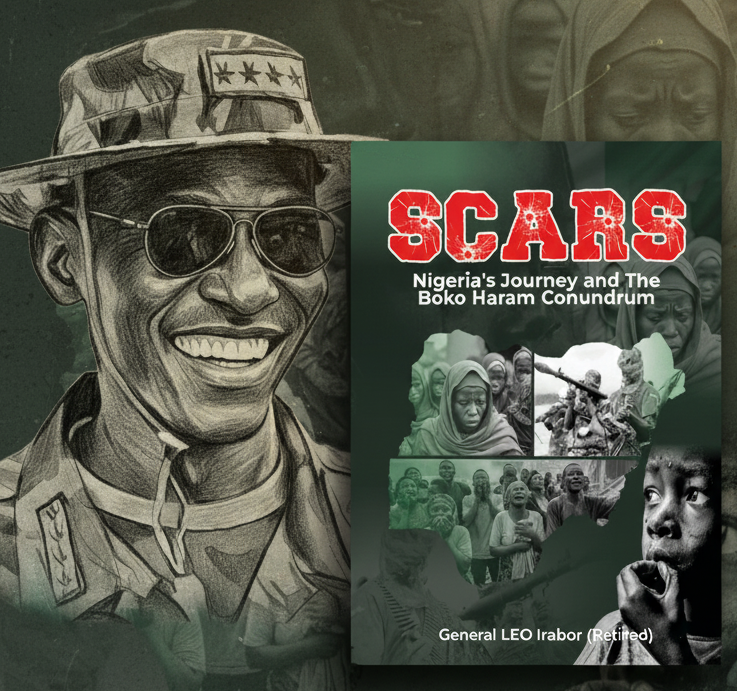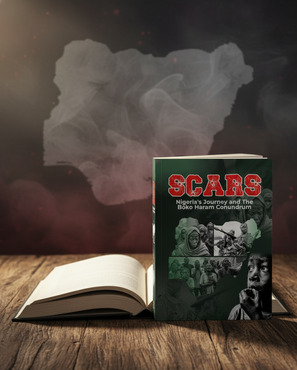- In the long history of every nation, there are scars that never fade.
- These wounds remind us of where we’ve been and what we’ve endured. For Nigeria, one of those scars is called Boko Haram.
What started in 2002 as a small radical group in the northeast grew into a challenge that tested Nigeria’s unity, leadership, and humanity. The Boko Haram insurgency was not just a conflict of gunfire and beliefs. It reflected the deep issues within our nation. - From this reflection, General Lucky Irabor (Rtd), Nigeria’s former Chief of Defence Staff and a respected voice in the fight against terrorism, shares his story in SCARS: Nigeria’s Journey and the Boko Haram Conundrum.
- This book is more than a standard military memoir. It serves as a national reflection, a journey of self-examination, and a call for understanding. It is recounted by a man who witnessed it all firsthand.

A Nation’s Mirror: The Meaning of “SCARS”
The title encourages reflection: What do our scars reveal about us as a nation? Were they caused by our enemies or by our own failures in unity, governance, and foresight?
In SCARS, General Irabor doesn’t just narrate battles; he urges readers to confront Nigeria’s history—its leadership crises, misaligned priorities, and the resilience that keeps its people moving forward.
He writes clearly as both a soldier and a scholar, blending firsthand experience with thoughtful analysis. Through his perspective, Boko Haram is not merely an enemy. It represents deeper issues within Nigeria’s political and social foundation.
Inside the Book: Three Journeys That Define Nigeria
The book is divided into three parts, each shedding light on Nigeria’s struggle and rebirth.
Part 1: The Ghost That Lives With Us
Here, General Irabor sets the stage by linking Nigeria’s fractured unity to its post-independence challenges and the notorious 1966 coup. He illustrates how years of distrust, failed leadership, and disunity allowed the insurgency to grow.
This isn’t just history; it serves as a reflection. The author’s encounters, from meeting soldiers on the frontlines to witnessing their conditions, raise haunting questions: How did we end up here? What went wrong? What can we still remedy?
Part 2: The Boko Haram Conundrum
This section explores the insurgency itself—not as a series of battles, but as a complex humanitarian and ideological crisis. General Irabor examines how misunderstanding Boko Haram’s motives and identity may have extended the conflict. He contends that to defeat an enemy, you first need to understand them—their beliefs, grievances, and manipulations.
Here, readers gain insight not only into military operations but also into Nigeria’s quest for peace amid ignorance, corruption, and fear.
Part 3: Eyes Set on Tomorrow
The final chapters shift the focus beyond war. Irabor calls for reconciliation, reform, and leadership based on empathy. He envisions a Nigeria capable of healing—a nation that learns from its scars rather than hiding them.
As he writes, the struggle for peace isn’t fought only with weapons but with wisdom, courage, and moral conviction.
A Human Story, Not a War Story
SCARS stands out because it goes beyond statistics and military language. It humanizes the conflict, portraying soldiers who fight with hope, families who rebuild from devastation, and communities that refuse to lose their spirit.
Through each chapter, readers feel the heartbeat of a wounded but resilient nation. It reminds us that resilience is Nigeria’s strongest weapon.
Endorsements That Matter
“SCARS is not merely a record of events or a military memoir; it is a thoughtful, human-centered exploration of the costs of conflicts, the burdens of command, and the resilience of both soldiers and citizens.” — Olusegun Obasanjo, Former President, Federal Republic of Nigeria
Obasanjo’s foreword captures the essence of this book: a contribution to peace, security, and development.
Why “SCARS” Matters Now

This book comes at a time when Nigeria—and West Africa—is still dealing with insecurity and disillusionment. By looking at Boko Haram through the lenses of history, leadership, and humanity, General Irabor offers lessons that reach beyond borders.
For students, policymakers, military thinkers, and everyday Nigerians, this book is more than a memoir. It serves as a national classroom—teaching about courage, mistakes, and our enduring hope for a better future.
Final Thoughts: Healing Through Understanding
Every nation carries scars. Ours tell a story of survival and strength—but only if we are brave enough to face them. SCARS: Nigeria’s Journey and the Boko Haram Conundrum challenges us to do just that—to learn, to heal, and to rebuild.
Get your copy today on https://sunshinebookseller.com/product/scars-nigerias-journey-and-the-boko-haram-conundrum/






